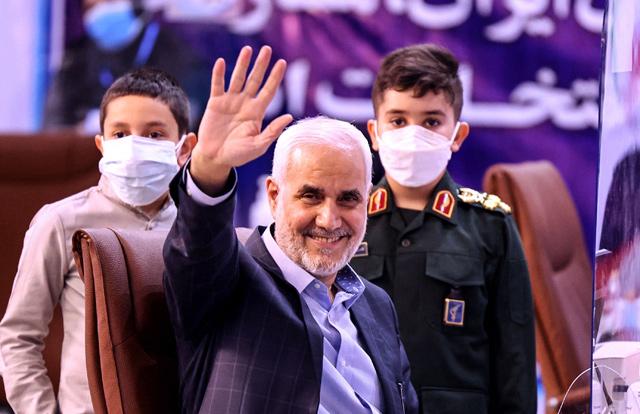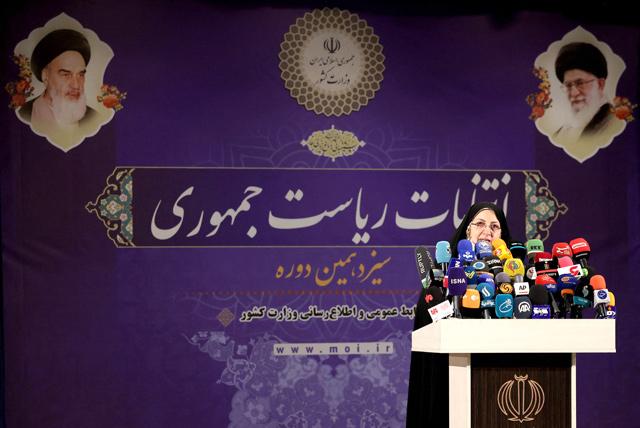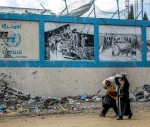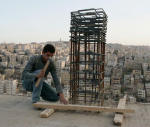You are here
Iran ultraconservative headed for presidency as poll rivals pull out
By AFP - Jun 16,2021 - Last updated at Jun 16,2021
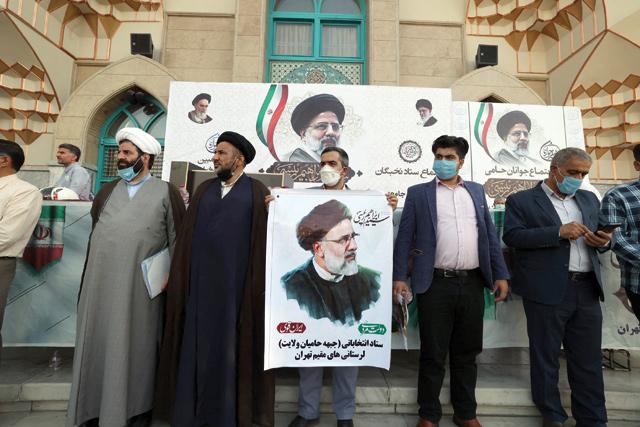
Clerics and supporters of Iranian ultraconservative presidential candidate Ebrahim Raisi carry his portrait during a rally in the capital Tehran, on Wednesday, ahead of the Islamic republic’s Friday’s presidential election (AFP photo)
TEHRAN — The field of candidates in Iran’s presidential election thinned out Wednesday, two days before the vote in which a victory by ultraconservative cleric Ebrahim Raisi is widely seen as a foregone conclusion.
Three of the seven men who had been approved to enter the lacklustre race pulled out, further bolstering the position of Raisi, 60, in a vote expected to see record low turnout.
Reformist Mohsen Mehralizadeh was first to leave the race on Wednesday, followed by two ultraconservatives, Alireza Zakani and Saeed Jalili, who both pledged their support for the frontrunner.
The election comes as economically ailing and pandemic-hit Iran holds talks with world powers to revive the battered 2015 nuclear deal and seeks to end a punishing US sanctions regime imposed under former president Donald Trump.
The vote will choose a successor to Iran’s moderate President Hassan Rouhani, whose administration had agreed the deal. This year he cannot run again, having served two consecutive four-year terms, and leaves office in August.
Ultimate power in Iran, where a revolution toppled the monarchy in 1979, lies with the supreme leader, Ayatollah Ali Khamenei, but the president has significant influence on issues from industrial policy to foreign affairs.
The expected winner, Raisi — the country’s judiciary chief and a cleric sporting a black turban and religious robe — has been mentioned in Iranian media as a possible successor to Khamenei.
Raisi belongs to the ultraconservative camp that most deeply distrusts the United States, labelled the “Great Satan” or the “Global Arrogance” in the Islamic republic, and which has harshly criticised Rouhani since the nuclear deal started to unravel.
The supreme leader, in a televised speech, urged voters to come out in droves to elect “a powerful president” — warning that “the Satanic power centres of the world” are trying to undermine the ballot.
‘Maximum pressure’
The landmark achievement of Rouhani’s eight years in power was the 2015 accord with world powers under which Tehran accepted limits on its nuclear programme in return for relief from international sanctions.
But hopes Iran would reap the benefits were dashed in 2018 when Trump ripped up the deal and launched a “maximum pressure” campaign aiming to isolate it diplomatically and economically.
The oil-rich country of 83 million, blocked by the US from trading with much of the world and shut out from financial systems, was plunged into a steep economic downturn with runaway inflation and mass job losses.
Iran saw anti-government unrest in the winter of 2017-18 and again in November 2019 — harshly put down both times — before the COVID-19 pandemic came and battered Iran harder than any other country in the region.
An ultraconservative victory would mean that, just months after US President Joe Biden replaced Trump, a hawk on Iran, Tehran could begin taking a harder line towards the West.
Analysts however argue that this would be unlikely to derail talks in Vienna between Iran and the other remaining parties to the nuclear deal — Britain, China, France, Germany and Russia — which have been indirectly joined by the United States.
The pain of Trump’s ramped-up sanctions has been the unifying theme in campaigning, and all candidates agree that Iran’s top priority must be to have them lifted.
Call to vote
Raisi’s remaining challengers include ex-Revolutionary Guard chief Mohsen Rezai and the former central bank governor Abdolnasser Hemmati, who is seen as a reformist but lacks the support of the main reformist coalition.
In case no candidate wins a clear majority on Friday, the two with the most votes will go head-to-head in a runoff a week later, on June 25.
Few campaign posters are seen in Tehran, and the mood has been dampened by the economic downturn and coronavirus restrictions, while observers expect many voters to abstain.
Tehran nursing student Narges, 20, like many young Iranians, said she was mainly concerned with making ends meet and worried about her future. Asked about the presidential election, she said she did not have “any particular feelings” about it.
Last month, the Iranian press had widely predicted a showdown between Raisi and moderate conservative Ali Larijani, an adviser to Khamenei.
But after the powerful Guardian Council barred Larijani and other heavyweights from the poll, the remaining hopefuls appeared unlikely to pose a serious challenge to Raisi.
Interior Minister Abdolreza Rahmani Fazli acknowledged that turnout among the over 59 million eligible voters “may be lower compared to previous elections”.
“A weakness in competition is one reason, and the coronavirus situation another,” he told journalists.
“But still, our people have always caused great surprises and are always present.”
Related Articles
TEHRAN — Iran on Tuesday approved seven hopefuls to run in next month’s presidential poll, a list dominated by ultraconservatives and deemed
TEHRAN — Two Iranian political heavyweights, ultra-conservative Ebrahim Raisi and moderate conservative Ali Larijani, on Saturday launched w
TEHRAN — Ultraconservative cleric Ebrahim Raisi was declared the winner Saturday of Iran's presidential election, a widely anticipated resul


